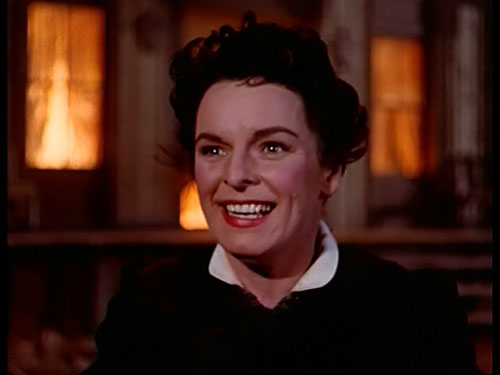
Johnny Guitar plays as part of a 15-film Nicholas Ray retrospective at New York’s Film Forum on July 26th & 27th.
***
"I searched for you in every man I met."
"You got nothin’ to tell me ‘cause it’s not real. Only you ‘n’ me, that’s real."
The first line is saloon owner Vienna (Joan Crawford) channeling In a Lonely Place’s Dixon Steele. The second is her ex-lover Johnny (Sterling Hayden) insisting that they’ve got a second chance. The first line is a feeling, spoken or unspoken, that courses through the veins of Bowie & Keechie, Jim Wilson & Mary Malden, Jeff McCloud, Jim Stark, and Tommy Farrell & Vicki Gaye—Ray’s most romantic characters. The second could summarize Ray’s entire cinematic project. Johnny Guitar (1954) is about what it takes to create the reality Johnny claims is his and Vienna’s.
Indeed, much of the reality Johnny and Vienna strive for is already in place. The first 45 minutes is, mostly, a singular, extended tango between various players, all within Vienna’s saloon. She built the place, and in many ways, it is an extension of her burning psyche. Her saloon is a vibrant pastiche of color, from the bright green of Vienna’s ascot to the flaming red of her lipstick. During the film’s final sequences, with her red-n-blue outfit that James Dean would ape a year later, and the canary-yellow man’s shirt, Vienna is contrasted even more sharply with the all-black of Emma’s (Mercedes McCambridge) gang.
One could say that Johnny Guitar is Ray’s most CinemaScope-like non-Scope film. In addition to finding the ability to expressively manipulate color that would find its way into all his subsequent films (Bitter Victory excepted), Ray also places bodies in space that activate either side of the screen, creating a horizontal balance to the frame that appears in Rebel, Bigger than Life, Bitter Victory, Party Girl and The Savage Innocents. Thanks to the narrower ratio and the insane colors, however, Johnny Guitar feels ready to explode in violent ecstasy.



The compositional tensions establish who the real opposing forces are in the film. Vienna and Johnny are lost lovers, coping with their pain, trying to find each other again. The Dancin’ Kid (Scott Brady) is the diagonal figure, neither sympathetic nor repulsive, and entangled with everyone in some form. But Emma and Vienna—now there’s a pairing. Vienna’s colors are a sign of the self-acceptance she has cultivated over the past five years. Emma, on the other hand, is pure, repressed rage. She gleefully seeks Vienna’s blood for two reasons: she hates what Vienna can express, and hates herself for desiring Vienna for that very reason. When she captures Vienna and sends the saloon up in flames, it is as though all of Emma’s repressed energies explode, a sexual release made perverse due to its violence. Fewer eyes have been more fierce in the cinema.


The fluidity of identity is the source of Vienna and Johnny’s hope. This fluidity can overcome the bitterness of their past, along with the despair of Emma’s destructive, McCarthy-esque qualities. (It must surely be no accident that Ray was one of Hollywood’s most unapologetic Leftists, and mysteriously never got touched by Congressional goons.) Vienna becomes a “masculine,” independent woman after five years of being away from Johnny. Johnny drops his guns and picks up a guitar. But thanks to the intervening forces in the forms of the Kid and Emma, they can’t begin again together. The mournful Peggy Lee title song—elegantly mixed with diegetic sound—suggests that with the destruction of Emma and the Kid, Johnny and Vienna’s future will be stronger than their past selves.
***
Homes for Strangers: The Cinema of Nicholas Ray is an on-going series of articles covering the 2009 retrospective on Nicholas Ray, running from July 17th to August 6th—with a special bonus on August 16th & 17th at the Anthology Film Archives—at New York's Film Forum.